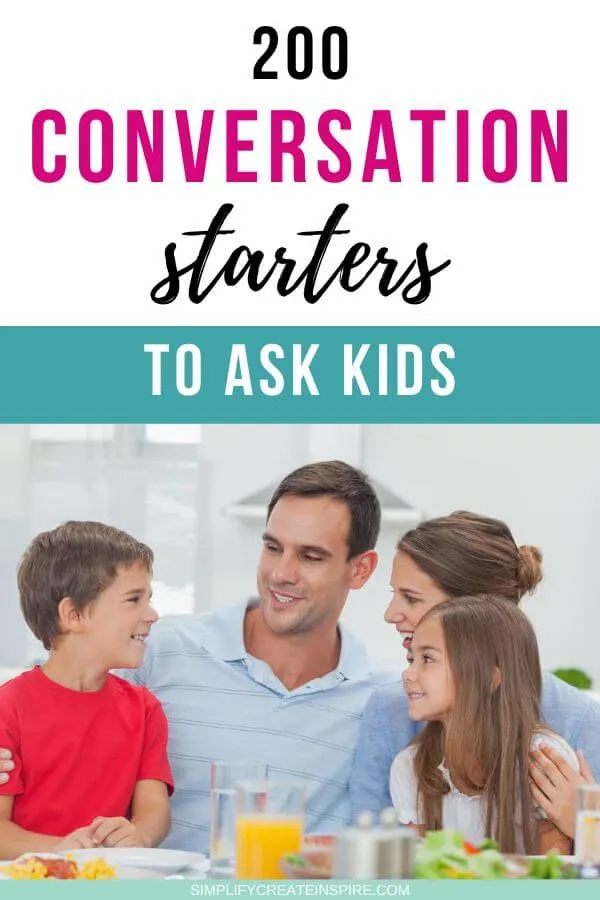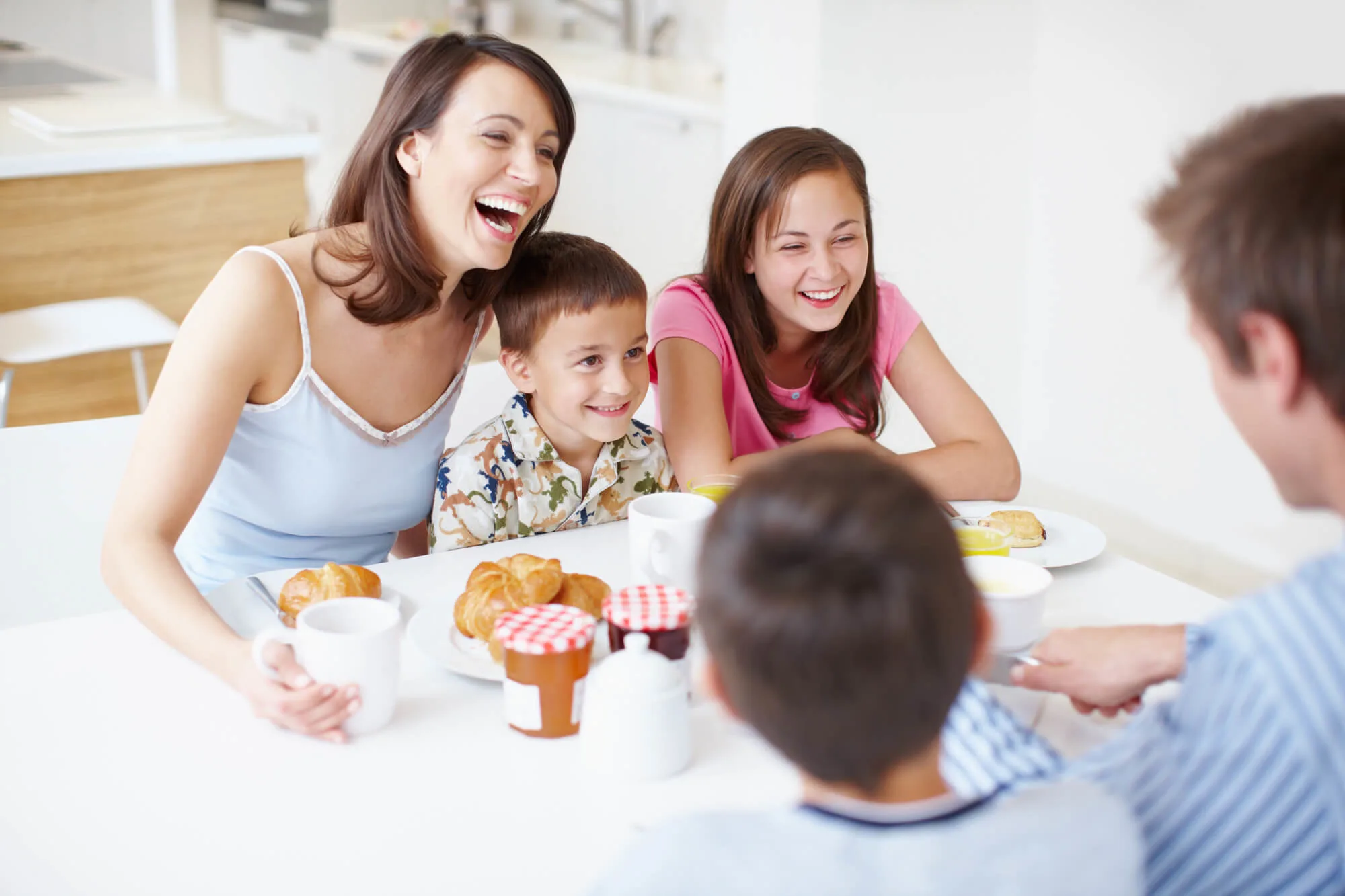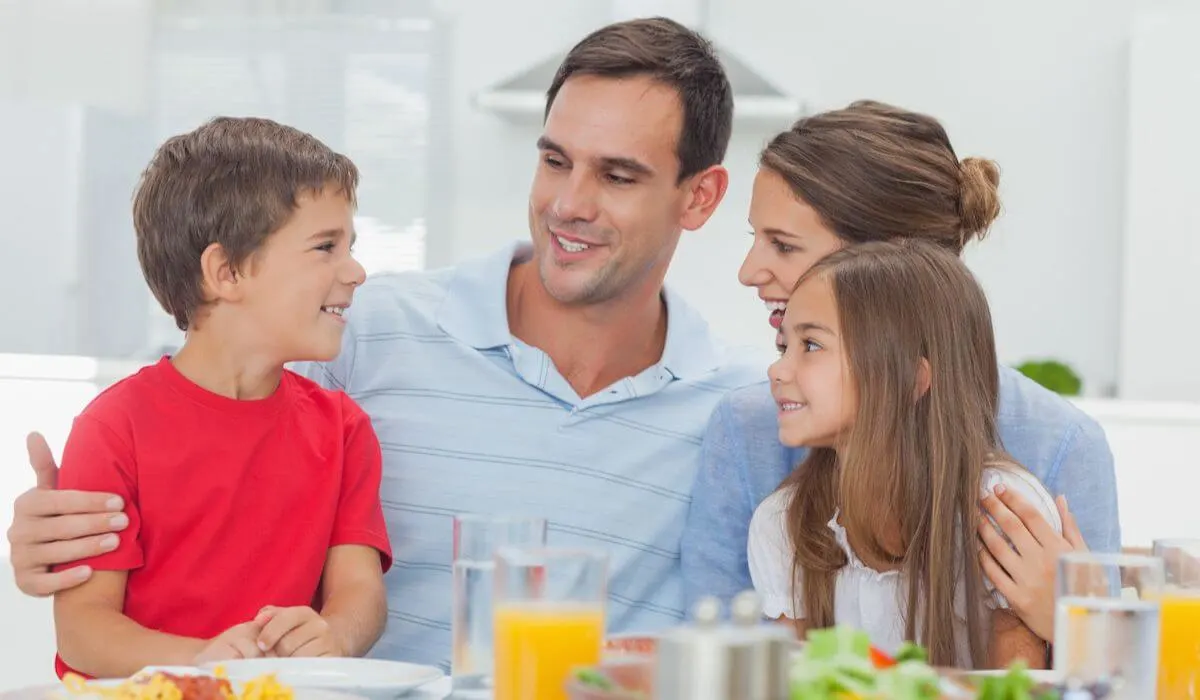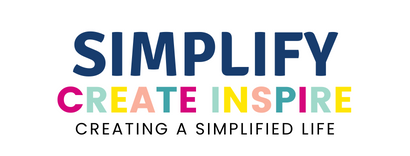Are you looking for conversation starters for kids? Any parent knows that it can sometimes be difficult to get your child talking and the older they get, the harder this can be. That’s where conversation starters can be a wonderful way to foster open communication with your child.
These questions to ask kids go beyond ‘How was your day?’ and are perfect for connecting with your child. They also help kids to develop critical thinking skills, creativity and communication skills. They also help you to get to know your child on a deeper level and have a little fun while you’re at it!
Having an open and honest relationship with your child is something that doesn’t just happen. It takes a conscious effort to ensure your child knows they can talk to you and always come to you in times of ncoveed.
And as any busy parent knows, sometimes we all get a little too preoccupied with what is going on around us that we don’t make the time and effort to really talk to one another. This happens for couples just as it does for parents and kids.
As kids get older, their peer group becomes a more important part of their world and they may be less inclined to share their day-to-day experiences with you.
That’s where conversation starters can be a great tool to foster communication in your family and help break the ice a little when you’re met with one-word answers.
While they aren’t going to magically turn your kids into open communicators, they can definitely be an effective tool to support loving relationships.

The Benefits Of Conversation Starters For Kids
There are some really wonderful benefits of using conversation starters with your kids to encourage conversation.
At the most basic level, asking your child questions shows you are deeply interested in who they are, their personal values and how they feel. This helps your child to feel more confident and secure, increasing trust and making it more likely they will come to you when they need help with problem-solving in future.
Positive family communication from an early age will help your child develop better communication skills overall and also support their growth in areas of gratitude, mindfulness, imagination, resilience and empathy.
You might also like these conversation starters for family dinner.
How To Effectively Use Conversation Starters With Your Child
Asking your child questions, such as these Would You Rather questions or the conversation starters below is a great way to encourage discussion.
While a simple question like “What is a skill you would like to learn?” might seem fairly straightforward, it opens up the potential for a much deeper discussion.
Here are some tips for using conversation starters with kids:
- Active Listening – Ensure you are using active listening while your child is talking. Listen carefully to what they are saying, give them your full attention and allow them to lead the conversation, without giving advice.
- Use Follow-Up Questions – If relevant, ask follow-up questions that relate to what your child has said to encourage a full discussion on the topic. This shows your child that you have a genuine interest in what they are saying.
- No Wrong Answers – This activity should be a judgement-free zone, allowing your child to speak what is on their heart and on their mind. Be thoughtful and supportive in your responses and create a safe space.
- Ask Questions That Require More Thought – Use open-ended questions rather than yes and no questions that allow kids to share their experiences.
- Allow The Conversation To Flow – It’s okay if your topic of conversation changes and you end up talking about something completely different because you may end up learning something surprising.
Ice Breakers & Funny Conversation Starters For Kids

Sometimes we are met with disinterest when we attempt to engage our kids in conversations. If you find this happening, you can attempt to break the ice with one of these funny questions to ask kids.
Most kids (and teens) have a much harder time resisting the urge to answer something silly, plus being silly together is important for family connection!
During my previous work as a psychologist working with kids in primary school settings, sometimes these silly questions were the key to overcoming nerves. Never underestimate the importance of having fun!
These funny conversation starters to ask kids are a great place to start:
- If you were the size of a mouse for a day, what would you do?
- If you could be any colour, what colour would you be?
- What is the silliest sound you can make?
- What is the silliest face you can pull?
- If you could invent a lolly flavour, what would it be?
- If you could be any animal, which would you choose?
- Would you rather have a pet dragon or a pet unicorn?
- If you could ban one food from your family dinners, what would it be?
- If you could only eat one food for the rest of your life, which would you choose?
- Would you rather eat snot-flavoured ice cream or ear wax-flavoured pudding?
- Do you like waffles or pancakes better?
- If you could be any famous person, who would you be?
- If you could meet a famous person, who would you choose?
- Would you rather be a rock star or a professional athlete?
- Would you rather drive a limousine or a helicopter?
- What cartoon character are you most like?
- Would you rather live in a tree house or a houseboat?
- What would your superhero name be?
- Which fictional character do you think would make a good friend?
- If you could give each member of your family new names, what would you call them?
- If you could discover a new planet, what would you name it?
- What is the silliest thing you’ve ever done?
- If you had a time machine, would you go back in time or into the future?
- Would you rather be a fast swimmer or a fast runner?
- Would you rather have a lot of money or a huge house?
Questions To Get To Know Your Child Better
At the most basic level, engaging your child in conversation is one of the easiest ways to connect with your child. This list of questions is great for getting to know your child, from their likes and dislikes to hearing about the things that are on their heart.
- What do you like most about being a kid?
- If you had one wish, what would it be?
- How would you describe yourself in 3 words?
- Who is your role model and why?
- What do you like to do when you have free time?
- What is your favourite hobby?
- What is your favourite food?
- What is the best gift you’ve ever been given?
- What is your favourite drink?
- What food do you like the least?
- What annoys you most?
- What TV show do you like the best?
- What is the thing that scares you most?
- What would be your perfect day?
- What is something you wish you could learn?
- What is your favourite thing about the city you live in?
- How do you like to relax?
- What is the best joke you know?
- Would you rather be rich or really smart?
- Would you rather be sporty or good at maths?
- Where do you like to go on vacation?
- What is your best vacation memory?
- What holiday or celebration do you love most each year?
- Do you prefer sweet or savoury food?
- Would you rather go bike riding or on a hike?
- Do you prefer swimming in a pool or at the beach?
- If you could only keep one toy, which would you pick? Why?
- What chore do you dislike the most?
- If you could live in any country, where would you live and why?
- What board game do you most like to play?
- Do you prefer quality time with your family or with your friends?
- Describe your dream house.
- What is the best dream you ever had?
- At what age do you think kids are old enough for social media?
Conversations Starters To Encourage Gratitude & A Positive Mindset
By human nature, our ingrained survival system is designed to detect threats. This is called the negativity bias and it can lead to us focusing on what is stressful or upsetting, rather than what is great. This is also why most of us will give greater weight to the impact of negative life experiences.
For this reason, practising gratitude is important for everyone. Not just kids!
It helps us to seek out the positive in each situation and gives us a better sense of control over difficult moments.
There are many ways you can encourage kids to develop a positive mindset. These growth journals for kids include daily gratitude prompts or you can read gratitude books with younger kids. These activities along with these gratitude discussion questions will help your child be more positively focused.
- What is the best advice someone has ever given you?
- What is the best advice you have ever given to someone else?
- What are 3 things in your life that you are grateful for right now?
- What does it mean to you to be grateful?
- How do you think having a positive attitude can help you in life?
- What advice would you give to someone who is struggling with having a negative attitude?
- What strategies can we use to turn our negative thoughts into more positive thoughts?
- What is something you can do each day to focus on the good things in your life?
- Who is the nicest person you know? What makes them so nice?
- What is the nicest thing someone has done for you?
- What is the best thing you can do to show someone you appreciate them?
- What is something that made you happy today?
- Who is someone you could help today and how?
Conversation Starters To Develop Resilience & Mental Strength

Getting your kids to think about overcoming obstacles and getting through the hardest days can be essential in building resilience. Realising that they have power in how they react to a difficult situation will help them grow from future experiences and use their problem-solving skills instead.
- How have you seen someone turn a challenging situation into a positive situation?
- What are some things you can do when you feel overwhelmed or stressed?
- How can we practice being kind to ourselves when we make mistakes?
- How have your own experiences with failure helped you learn?
- Can you describe a time when something did not go to plan but you were able to make it better?
- Can you think of a time when you used problem-solving skills when faced with a challenge?
- How can you use self-reflection to learn from your mistakes?
- What strategies help you when you feel unmotivated or discouraged?
- How have your own experiences made you stronger?
- What do you think it means to take responsibility for your actions?
- What was your most embarrassing moment? How did it make you feel?
- How can you make school today great?
- What can you say to yourself when something is hard to do?
Questions For Kids To Develop Empathy
It’s not unusual for kids to be far more focused on their own little world than it is to consider what might be going on for people around them. This is completely normal.
Yet it can be beneficial to use these questions to help your child to start considering a different point of view or life experience to support the development of empathy.
- What is something you could do to cheer up someone who is sad?
- Can you think of a time when someone’s kindness made an impact on your life?
- Why is it important to show appreciation for the people in our lives?
- Can you think of a time when you made an effort to show understanding towards another person’s situation?
- What is the best way to handle a disagreement with a friend or family member?
- How can we put ourselves ‘in other people’s shoes’ to better understand something they are experiencing?
- If someone is upset, what are some ways we can support them?
- How do you think someone would feel if they were being teased?
- Do you know someone at school who gets teased? Do you know why other kids tease them?
- How do you think someone feels when you show them kindness?
- What do you think it looks like when someone is using active listening skills?
- What can you do when trying to identify how another person is feeling?
- Do you think it is possible to understand how someone is feeling even if you have not had the same experience as them? Why?
Conversation Starters To Build Confidence

While you might think your child has a good grasp on their personal talents and positive traits, many do not see these things in themselves in the same way they might see them in their peers. Questions that help kids to identify their strengths and talents help them to boost their confidence.
- What is something that makes you feel proud of yourself?
- What is something you are really good at?
- How can we celebrate our own successes and wins?
- What is something you have accomplished recently?
- What is something you are really good at?
- What is a challenge you faced recently and how did you overcome it?
- What makes you feel confident?
- How can you give yourself a confidence boost when you feel nervous?
- What are some things that make you feel really good about yourself?
- Can you think of some ways that boosting other people’s confidence can make you feel more confident too?
- What is the best way you can get better at the things you like doing?
- What are some things you could practice to get better at?
- What is something you could teach other people to do?
- How could you make a difference in the world?
- What is the hardest thing you have ever achieved?
- What trait do you love most about yourself?
- What do you think is an important quality for someone to have?
- What is the bravest thing you have ever done?
Questions For Kids To Encourage Ambition
We want what is best for our children and it can be difficult to get kids to focus beyond the immediate future. These questions encourage kids to think long-term and to start considering what their future could look like and how they want it to look.
Encouraging kids to engage in goal-setting activities from an early age will help make these habits more concrete as they grow.
- How can you stay motivated to achieve something you want?
- What does success look like to you?
- Who is someone you consider to be very successful? Why?
- Why do you think setting goals is important?
- What do you think is important when setting goals?
- What job would you like to have when you grow up?
- Why do you think you would be good at this career?
- What is one goal you would like to achieve in the next month?
- What is one goal you would like to achieve in the next 6 months?
- What are some steps you can take to make these goals possible?
- What are some ways you can remind yourself to stay focused on your goals?
- How can you motivate yourself when you are not making the progress you want?
- Who can help you with reaching your goals?
- What will you do if you don’t reach your goal by the time you hoped?
- What things can you do now to help you work towards the future career you want?
- What are some things you can do to earn money?
- What is better – having a quick win on a small savings goal or waiting longer to reach a big savings goal?
- What is the biggest dream you have right now?
Conversation Starters To Encourage Critical Thinking & Creativity
Getting our kids to think outside the box, by using critical thinking and creativity are great ways to develop their problem-solving skills. These skills will help them as they move through different stages in life, and remind them that they are capable of looking at things from a different perspective.
This skill doesn’t come naturally. It is a learned skill and these questions will help develop those skills in your child.
- What is the best way to approach a difficult problem you are having?
- Can you think of a time when you tried something different and it lead to success?
- If you could change something in the world, what would it be?
- If you could invent something, what would you invent and what would it do?
- What is something you could do to make the lives of other people better or easier?
- If you were to write a book, what would it be about?
- If you won $1000, how would you spend it?
- If you could have any superpower, what would it be? Why would you choose that?
- If you could talk to any animal in the world, which animal would you choose and why?
- What is something you believe in that someone else might not agree with?
- What is a way that you could make your morning routine better?
- If you could make your own television show, what would it be about?
- Do you think you would make a bigger difference in the world if you were a scientist or a doctor? Why?
- What are 3 ways that technology is improving the world?
- What are 2 things you can do now that can benefit the environment in the future?
Questions To Ask Kids About Family & Relationships

Positive family relationships are essential for thriving kids. Just as their relationships with other extended relatives and friends are important too. All of our child’s relationships play a role in who they are and how they feel.
Questions about family and relationships are a great way to know your child’s heart and understand what they value and where they feel things could be better.
Remember your role is active listening – even if you find some of the answers harder to hear. You want your child to know it is a safe place for them to say anything they are feeling and to use these discussion topics for kids to start conversations you might not normally have.
- What is something we should do more of as a family?
- What is your favourite childhood memory?
- What is something you would change about our household rules?
- In what ways can we communicate respectfully with others?
- What can we do if we feel hurt or misunderstood by someone else?
- What do you think is important for your family to be happy?
- In what ways have your relationships with family members changed over time?
- What does it mean to be a good friend?
- How can you show someone you care about them?
- What things do you think would help make your family life better?
- What are some things you enjoy doing with your loved ones?
- What should we do if we know we have hurt someone else’s feelings?
- How would you mend a broken friendship?
- Do you think it is possible to disagree with someone and still get along with them?
- What is one of the most important lessons you have learned from your family?
- Do you think the discipline and consequences in our family are fair?
- If you could create 3 family rules, what would they be?
- What are the most important qualities of a good parent?
- How can you be a good sibling?
- What is your favourite family tradition?
- What is your favourite thing about our family?
- What is something nice you could do on a friend’s birthday?
- What is an important value for a best friend to have?
- Do you prefer to spend dinner time at the table or in front of the tv?
- What do you think is the hardest rule to follow in our household?
- What is the most important thing to you when it comes to family?
- When was the last time you felt really loved?
- What are 3 things that make you feel loved?
- Do you think we spend enough time together as a family?
Conversation Starters About School
As parents, we don’t get the opportunity to see our kids in the school environment very often, so engaging your child in questions about school can be a good way to learn a little more about their school life.
Questions about school can sometimes lead to your child sharing challenges they are facing with other kids or with learning difficulties, without us having to be really direct. Some kids are scared to share these issues, so this can be a much easier way to warm them up to the more important school conversations.
- What do you like most about going to school?
- What is your favourite part of the school day?
- What is one thing you would change about your school?
- Are there parts of your school that you don’t like?
- What advice would you give someone who is new to your school?
- What are some ways you could welcome a new person to your school?
- What do you think of your teacher?
- Do you like the class that you are in?
- What is your favourite subject to learn at school?
- What subject do you like the least?
- What is the most interesting thing you have learnt recently?
- What is something you find hard at school?
- Are there any extra activities outside of school you wish you could do?
- Who are your best friends at school?
- Have you ever been bullied or teased at school?
- What are some things you can do if other kids are being unkind?
- Who is your best friend in your class?
- What is the best book you have read at school?
- Do you feel that your school is a safe place?
- What are the biggest challenges for you at school right now?
These conversation starters for kids are the perfect way to encourage meaningful discussions and connections. They are sure to come with some surprising answers and the chance to get to know more about what matters to your kids. I hope these conversation topics for kids help get your kids to open up!
Do you find it challenging to engage your child in conversation? What things do you do to get them talking?
You might also like these articles:
- Best gratitude and growth journals for kids
- How to bond with your kids
- Confidence-building tips for girls
- How to help kids be more resilient
- Benefits of limiting screen time
- LEGO play and learning activities
- How to get your kids doing chores
- Cleaning games for kids
- Things to do on the school holidays
- How to teach kids about germs
- Fun activities for kids at home
- Things to do at home in your backyard
